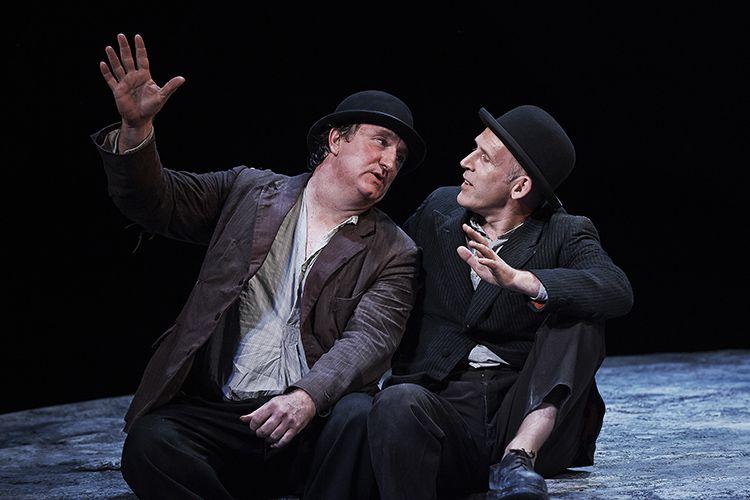
An air of the eerily bizarre hangs upon the stage with the beginning of Gare St. Lazare Players’ version of Waiting for Godot.
Estragon (“Gogo”) fumbles with his too-tight boot, squatting in a divot of the monolithic stone disc that makes up the main area of the set. Vladimir (“Didi”), a vampiric figure in a black suit and a bowler hat, looks up from the shadows and blatantly ignores the line “Gogo light … Didi heavy.”
The famous “tragicomedy in two acts,” which began playing at Emerson College’s Paramount Center on Oct. 31, is here represented as something dream-like and ethereal, noticeably lacking the gravity and weighted physicality of many other renditions.
Directed by Judy Hegarty Lovett and boasting gorgeous set and costume design by Ferdia Murphy, this version of Samuel Beckett’s career-defining absurdist masterpiece offers a stunning interpretation that mixes an otherworldly set design with a cast whose take on the characters is surprisingly human.
The players move and act with a disorienting state of normalcy — that is, considering the mirroring effect of the cratered circular main stage, and the projection of the moon on the screen behind it. Conor Lovett interprets Vladimir as having as much introspection as intelligence, performing many of the character’s lines with an air of self-assurance.
Gary Lydon artfully contrasts Lovett’s Didi with a bumbling and grumpy Estragon. Strangely enough, the two main characters here appear to have spent their 50 years of decrepit homelessness squabbling — their argument in the second act over whether they should go their separate ways seems less like an endearing ploy by Gogo to better their existence and more like a spat between an old married couple, always rehashed and never resolved.
This version beautifully highlights one theme of the play: that life is a series of repetitions, different days with the same outcome — or rather, no outcome.
Lovett and Lydon may dominate the production with their passive-aggressive bickering and their tender embraces, but it is this version’s portrayals of the aristocratic Pozzo and his slave Lucky that steal the show. Gavan O’Herlihy plays Pozzo as a gruff and boisterous old man.
This Pozzo’s pomposity is all the more enjoyable to see transform into insightful blindness in Act Two, where O’Herlihy overacts both sides of the character in a way that is hysterical, yet often depressing.
More engrossing than all other aspects of the play is Lucky. Played with haunting stoicism by Tadhg Murphy, Lucky is here depicted as no more than a prop — a tool that Pozzo uses solely for carrying his luggage.
The classic character is herein subverted — while he is usually made to be a point of sympathy for the audience, Murphy plays Lucky devoid of any humanism, shuffling about the stage like a clumsy robot. In many ways, his is the most humorous performance of the show, while simultaneously portraying the most pathetic analysis of the character possible.
Lucky has here been reduced to the point of having no sympathetic personality whatsoever, eliciting from the audience the least amount of empathy for the character that arguably deserves it the most.
As with Pozzo, this extreme caricature makes Lucky’s “think” all the more poignant — the actor’s elocution of rhythmic and repetitive nonsense left the audience in a state of such astonishment that the entire theater took a moment to catch their breaths before giving a rousing applause. Murphy’s Lucky is nothing short of triumphant.
Lovett’s direction of Waiting for Godot returns the unorthodox to a play that has for far too long been considered an immutable part of the English theatrical canon.
By altering many of Beckett’s original stage directions — and completely ignoring others — the Gare St. Lazare players of Ireland have created a version of Beckett’s tragicomedy that, while offering as much food for thought as the original, remembers the most important function of a play: entertainment.
The energetic ensemble, the beautifully minimalist and uncanny set design and the artful mixture of witty philosophy and physical comedy have the audience forgetting all of the academia and scholarly arguments about the play, lost on the moon with Didi and Gogo.
“Entertaining” is an understatement.
This is an account occasionally used by the Daily Free Press editors to post archived posts from previous iterations of the site or otherwise for special circumstance publications. See authorship info on the byline at the top of the page.



